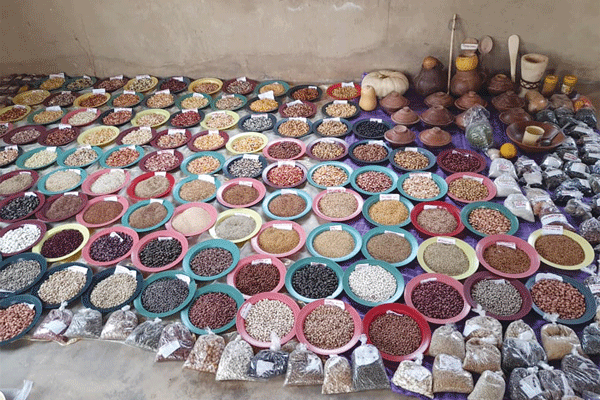
By MARGARET CHINOWAITA BORN in Gutu 57 years ago, female smallholder farmer, Movai Matombo ventured into agroecology farming in 2010.
A mother of four, Matombo says she got married in her 20s and lived in Bikita, but later resettled to the Shashe area, Mashava in Masvingo province, Zimbabwe, where she learnt about agroecology farming, a method that brings much yield while conserving the soil and the environment.
The Shashe community has a history of practising productive farming, which has increased yields and preserved the environment through low use of chemical inputs.
The process is known as agroecology and it was built on traditional farming methods that are passed from generation to generation.
“When I moved to Shashe with my husband, I knew about farming, but I was ignoring some practices that I was taught by my mother and grandmother. I thought this farming was ancient, but farmers in Shashe changed my mind. I am now practising agroecology,” Matombo said.
“We use what are called women seeds, which include nuts, legumes, small grains, and these seeds are generally grown from a section of land set aside for women.
“Men seeds are cash crops such as maize, farmed at a large scale. Normally, I decide what is planted on my portion as well as when to harvest and sell my produce. I use seeds that I keep in my seed bank. I never use hybrid seeds.”
Another farmer, Deline Zembete (49) from Shashe, who is married with three children, said: “Our land is 8ha, my husband gave me 2ha to farm my seeds such as nuts. I do not use artificial fertilizers on my portion even on the whole area.
- Chamisa under fire over US$120K donation
- Mavhunga puts DeMbare into Chibuku quarterfinals
- Pension funds bet on Cabora Bassa oilfields
- Councils defy govt fire tender directive
Keep Reading
“I use farming methods that were passed on to me by my mother and grandmother. I used to see them applying cow and goat manure and leaves from the mountains as fertilizer. They also used seeds kept in traditional seed banks.”
Zembete said she was not using hybrid seeds, but was using seeds that were passed down to her by her parents and grandparents, and some that she grew herself.
“I had this knowledge when I came to Shashe, but this was enhanced by ZIMSOFF [Zimbabwe Smallholder Organic Farmers Forum], an organisation that taught us about agroecology farming,” Zembete said.
She said the founding chairperson of ZIMOFF, Elizabeth Mpofu, is herself a seed custodian. Zembete said Mpofu had a traditional seed bank at her house.
“I had the opportunity of inspecting the seed bank at her homestead in Shashe. She leads by example. Her homestead is one of the centres of excellence in Shashe. As the founding member of ZIMSOFF and part of the six African women that formed Africa Women’s Collaborative for Healthy Food, Mpofu lives and works in Shashe community.
“We farm using our own seeds. These seeds are adaptable to our environment. They suit the rain pattern, Shashe is in region four. We are in a dry area, and we encourage production of small grains and women seeds such as nuts and legumes. We produce wholesome food that is nutritious, that can minimise diseases and lifestyle conditions such as diabetes and high blood pressure.
“A plate of food consumed at a homestead in Shashe and other areas that are practising agro ecology is full of nutrients. You get different kinds of foods such as millet, sorghum, meat, vegetables, soup and fruits. Our children go to school well fed on nutritious foods, they carry such things as samp mixed with nuts and legumes, peas or beans and a bottle of maheu, drink.”
Chronic malnutrition and stunting remains a major challenge in Zimbabwe.
The country has a double burden of malnutrition, where less than 10% of children aged six to 24 months consume the minimum acceptable diet, while 6% of children under the age of five in rural areas are more likely to be stunted and underweight than those in urban areas due to a combination of reduced food availability caused by poor agricultural performance, low access to food due to high levels of poverty and poor food utilisation due to lack of knowledge on how to use the available food, a statement from the Food Agricultural Organisation website said.
Mpofu said if agroecology is understood and practised by every woman and supportive men, Zimbabwe, Africa and the world would have good food that could ensure a healthy people.
ZIMSOFF is a member of the Africa Women’s Collaborative for Health Food Systems.
“It promotes a way of life that respects, takes care of, and restores Mother Earth and her resources while benefiting African people and their communities. We mainly look at Women’s Seed, a programme that uses women’s seeds for healthy foods in at least six African countries to support the health and nutrition of communities that face marginalisation and discrimination in rural and urban areas. Pastoralist, indigenous and peasant women will secure contracts to provide locally-produced food to schools, clinics and local markets,” Mpofu said.
She said the initiative used local seeds that were cultivated and conserved by women over generations.
ZIMSOFF envisions improved living standards of organised and empowered smallholder farmers in Zimbabwe practising sustainable and viable ecological agriculture and its mission statement is to influence policies and public awareness towards agroecology and smallholder farmer’s rights.
ZIMSOFF national co-ordinator Nelson Mudzingwa said members are organised in four regional clusters, covering the whole country except Harare and Bulawayo. Households in each region are organised as a group, a number of these form a smallholder farmers organisation (SFO), and several SFOs form a cluster.
Recently, ZIMSOFF as a member of the Zimbabwe Seed Sovereignty Programme (ZSSP), held a Seed and Food Fair.
Women farmers showcased some rare seeds that are prevalent in their rural areas.
Women, who were well-represented at both food fairs, said they were yearning for markets for their produce.
Shashe local authority representatives such as the district administrator, Agritex officers, the police, health professionals, and the headmaster of a local school all spoke positively about the use of agroecology and the production of organic food that is wholesome and nutritious.
Shashe Endogenous Development Organisation, is one of the SFOs in the central cluster.
Based at the Masvingo Rural District Council, this group started working together in 2000 as an agroecological community where members of other communities could visit, spend a few days, and learn from the practices of the local farmers, especially focusing on seeds, soil and water conservation, integrated livestock management, and the local efforts to link producers and consumers.
Shashe was formed by formerly landless farmers who engaged in a two-year land occupation exercise before being awarded the land through the government’s land reform programme.
As in the other clusters, the Shashe Endogenous Development Organisation is particularly interested in training other farmers and enhancing a community-based and horizontal learning system.
Hundreds of families are “connected”, sharing the knowledge gained from their own experience.
Follow us on Twitter @NewsDayZimbabwe











